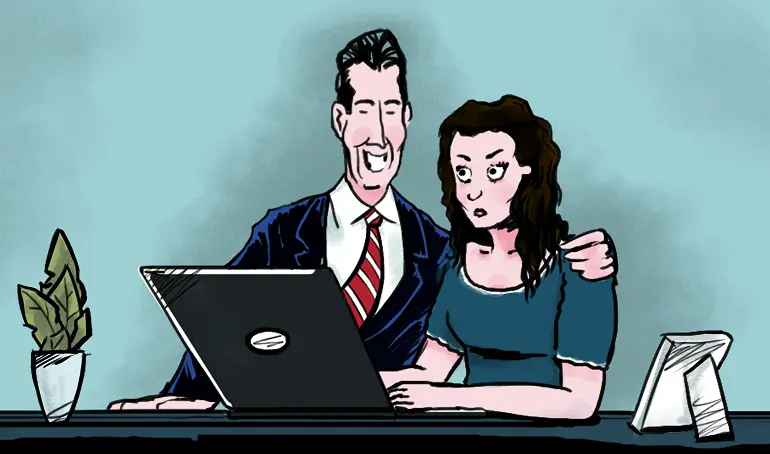
Workplace Sexual Harassment and Arbitration Agreements
February 23, 2023
For years, employers have pushed victims of workplace sexual harassment to give up their right to file a lawsuit. But a recent law means new rules.
By Genevieve Carlton, Ph.D.
Millions of Americans have signed an arbitration agreement with their employer. But most don’t know what that arbitration agreement means or even that they ever signed it. Many new hires click through electronic documents during the onboarding process without realizing they’ve given up the right to sue their employer.
In practice, an arbitration agreement limits your right to file a lawsuit against your employer––even if you experience discrimination, wage theft, or sexual harassment. Instead, you are forced into the arbitration process, which looks very different from court.
In 2022, Congress passed a new law banning arbitration for workplace sexual harassment claims. The law puts more power in the hands of employees.
“Forced arbitration has proven immensely harmful when it comes to sexual harassment and sexual assault,” according to Senate Majority Leader Chuck Schumer. “When workers, almost always women, face abuse or harassment at the hands of their employers, forced arbitration immediately limits their options for remedy. The deck is stacked against them from the start, and thus abusers rarely face true accountability.”
The Problem With Arbitration Agreements
What’s an arbitration agreement? A growing number of companies make arbitration clauses mandatory––and workers pay the price.
By signing an arbitration agreement, employees give up their ability to file a lawsuit against their employer. Instead, they agree to undergo arbitration.
“We’ve outsourced our justice system, as far as workers and consumers are concerned,” Julia Duncan of the American Association for Justice told the Washington Post. “Very few people go through the forced arbitration process because it’s so rigged, and the ones that do almost never get relief.”
An estimated 60 million Americans had signed arbitration agreements in 2018––a number that has grown during the pandemic.
During arbitration, private judges take the place of the court system and decide the case after the presentation of evidence and formal argument. Violations that once went to court––like workplace discrimination, wage theft, and sexual harassment––instead take place behind closed doors.
This is particularly advantageous to employers in that they need not fear publicity; in certain egregious cases against large employers, it is their reputational interest that drives them to settle large, a concern they do not have in confidential arbitration.
Arbitration favors employers. Unlike court, closed arbitration hearings avoid any publicity. That means large employers concerned about their reputation are less likely to settle.
In 2020, only 1.6% of arbitration cases resulted in employees receiving compensation. And if the arbitration process rules against the worker, they have no right to appeal.
What’s more, arbitration leads to smaller damages for victims. In state courts, victims received median damages of $86,000. In federal court, that number climbed to $176,000. Median damages in arbitration were a much smaller $36,500.
“Forced arbitration allows companies to get away with bad behavior,” attorney Brian Spitz told the Washington Post. “Employers should not get to secretly defend their conduct behind closed doors.”
Learn more about forced arbitration agreements and how they hurt workers.
Arbitration Clauses and Sexual Harassment
Forcing victims of discrimination or wage theft into closed-door arbitration sessions clearly hurts workers. But the harm is even graver for arbitration clauses for sexual harassment claims.
Forced arbitration clauses in employment contracts leave victims with fewer remedies. New hires must sign the arbitration agreement as a condition of employment. If they experience sexual misconduct or harassment at work, they cannot take the perpetrator to court.
Instead, victims had to enter a private arbitration with their employer. The results remain sealed.
“More than 60 million Americans are subjected to forced arbitration clauses in the workplace, preventing them from choosing how to seek justice for wrongful and abusive treatment,” explains Rep. Pramila Jayapal. “Survivors should have the opportunity to use their voices however they see fit.”
The 2022 law banned forced arbitration for workplace sexual harassment. Companies can no longer force victims of sexual misconduct into closed-door arbitrations. Instead, victims can file a lawsuit.
“It will help us fix a broken system that protects predators and corporations and will help to end the days of silencing survivors,” according to New York’s Sen. Kirsten Gillibrand.
The bill won bipartisan support. Republican Sen. Lindsey Graham said, “The arbitration system is fairly skewed toward the company, and to take a job I don’t think you should be required to give up your day in court if you claim something untoward happened to you.”
Ending Workplace Sexual Harassment
President Biden signed H.R. 4445, the Ending Forced Arbitration of Sexual Assault and Sexual Harassment Act of 2021 in March 2022. And when the law went into effect, it automatically voided arbitration agreements for sexual harassment, sexual assault, and other forms of sexual misconduct.
The law puts more power in the hands of workers. Employees who experience sexual harassment at work have more options. They can voluntarily agree to arbitrate the dispute with their employee or choose to file a lawsuit.
Under the new law, employers also can’t force employees to waive their rights to a class action lawsuit related to sexual harassment. Nor can they put the burden of paying for arbitration on victims.
As Sen. Gillibrand explains, forced arbitration clauses “are especially prevalent in low-wage fields and industries with a disproportionate high number of women of color.”
“These clauses leave those women who cannot afford to challenge their employers without any recourse. Survivors deserve a real chance at justice.”
Workplace sexual harassment remains a major problem. But the new law represents an important step forward. Instead of covering up harassment in sealed forums, employers will be held accountable in court. And victims who want their day in court will have that right.
Have you experienced sexual harassment at work? Learn more about your options by contacting an employment lawyer for a free consultation.